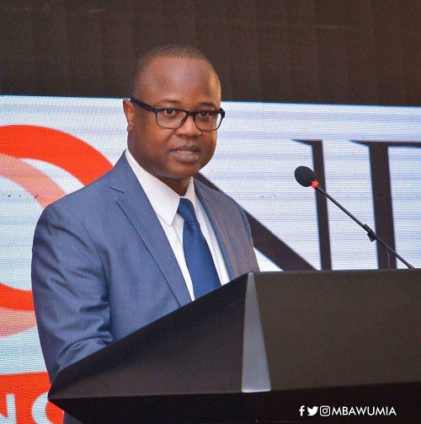The Bank of Ghana is calling for a regular debt management that include consistent access to domestic market with an eye on non-resident investors.
According to the First Deputy Governor, Dr. Maxwell Opoku-Afari, there is the need to ensure regular access to the international capital market, the maintenance of a stable exchange rate and inflation, as well as sustained real sector growth at the rate enough to pay down existing debt.
For frontier economies like Ghana, Dr. Opoku-Afari who was speaking at a virtual conference on “Financing Low-Income Countries” said debt sustainability and growth have become the most critical policy anchor, underpinning macroeconomic management.
Speaking on the theme “Towards Realistic Aspirations and Concrete Actions in a Post-Covid 19 World”, the First Deputy Governor emphasized that the country has opted for the clear path that requires maintenance of sound macroeconomic fundamentals that will ensure market access at least cost and at the same time engaging the attention of non-residents at the longer end of the domestic market.
He said the Debt Service Suspension Initiative (DSSI) or even calls for debt cancelation can provide enormous relief to countries to deal with the current debt challenges.
“Nonetheless, there are major risks including the signal it sends to the market about credit worthiness, potential loss of market access in the medium to long term, probable increase in the cost of external financial and risk of moral hazard”, he pointed out.
“Importantly, while efforts at mobilizing subsidised funds to support emerging economies is a welcome one, as these will help meet present critical social spending needs at reasonable cost, a more enduring support including correcting the narratives of our economies in the international discourse space, highlighting the opportunities for growth above the global average is critical and also encouraging investor interest in impactful infrastructural projects that would enable our economies to expand the capacity to generate higher sustainable and equitable growth is another channel through which the international community can support fiscal sustainability in the economies of developing countries like Ghana”, he added.
He however concluded that it is important for developing and emerging economies to be supported to be strengthen and implement reforms aimed at dismantling bottlenecks in domestic revenue mobilization and administration, amongst others.
Total public debt stock
Ghana’s total public debt stock hit GHS263.1 billion [$46.3bn] in July 2020, according to the BoG Summary of Macroeconomic and Financial Data.
This represented about 68.3% of the country’s Gross Domestic Product.
From the figures, the external component alone is estimated at GHS138 billion [$24.3bn], representing 35.8% of GDP.
The domestic component of the debt is also estimated at GHS125.1 billion, approximately 32.5% of GDP.
The financial sector resolution bond however constitutes GHS14.2 billion, which is equivalent to 3.7% of GDP.
Latest Stories
-
19 steps for getting over even the most devastating breakup fast
2 hours -
8th Ghana CEO Summit launched with focus on AI transformation, economic diversification
2 hours -
Prof Opoku-Agyemang has not been given a fair appraisal – Ablakwa
3 hours -
Rainstorm wreaks havoc in Keta and Anloga districts, residents count their losses
3 hours -
Global Plastics Treaty negotiations begin in Ottawa as countries converge on phasing out problematic plastic uses
3 hours -
Support energy alternatives adoption to sustain businesses – GUTA tells government
3 hours -
11th DRIF opens in Accra with a call on governments to focus on digital inclusion
3 hours -
Stakeholders outline plans at RE4C Coalition’s General Assembly in Accra
3 hours -
Women Need ‘shock observers’ for active political participation – Ex-Bauchi Assembly Member
3 hours -
2024 polls: Stop fighting over positions in Mahama’s next government – Asiedu Nketiah
3 hours -
Although people may not always listen to the lyrics, there’s still a market for rap in Ghana – E.L.
3 hours -
Passengers appeal to transport operators to officially announce new fares
4 hours -
Damongo: About 400 NPP Members resign over Minister’s alleged meddling in chieftaincy affairs
4 hours -
Next NDC government will pay special attention to women – Naana Opoku-Agyemang
4 hours -
Amerado is singing and it’s good he’s doing that – Lyrical Joe
4 hours

